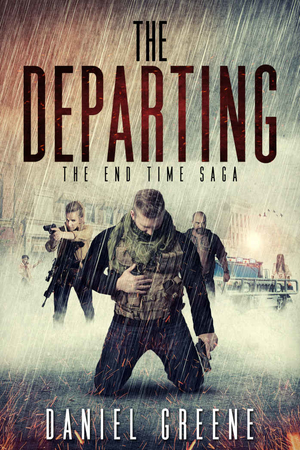
Having read this series from the beginning, one can expect something approaching greatness in Daniel Greene’s writing, and he does not disappoint with The Departing, the fourth installment of his End Times Saga. The stakes have been consistently raised throughout the course of this series, and the characters have traveled on impressive and well-planned plot arcs, revealing a talented writer and a body of work clearly conceived with a passion for the genre.
The world is still in chaos as the dead mindlessly push back the ranks of the living, threatening to exterminate humanity as we know it. However, despite that larger premise as a constant threat in these books, the small-scale conflicts are what carry the story.
Similar to “The Walking Dead,” the zombie threat is always a factor in decision-making for these characters, and is the foundation from which the plot was launched, but it becomes secondary to powerful interactions and rich emotional exploration. Characters like Colonel Jackson, Kinnick, Gwen, Mauser, Steele and others have persisted through these books and have grown immensely, making each successive book an even deeper pleasure to read. Even so, this is a hard world, and not every major character makes it through this fourth book intact, or alive, yet Greene executes those challenging scenes with grace.
At the start of this series, it appeared that Steele would be the dominant protagonist, but with this much narrative space to work with, other characters have stepped up, particularly in this fourth book, and shown themselves capable of carrying a major storyline. Gwen comes to the forefront in a huge way in The Departing, and she’s been easy to root for throughout the series.
The subplots and minor stories that tangle together are what makes the world feel so complete. Greene is eager to show a wide range of perspectives surrounding this premise of a zombie apocalypse, not just a single group of individuals moving through a dystopian landscape together. By geographically and philosophically spreading out the characters, but masterfully linking plot lines when it suits his purposes, Greene creates a multi-faceted future that is believable and engaging.
The military jargon and the ease with which the author discusses Operation: Homefront and the inner workings of combat make the reading experience authentic and enjoyable, even for a reader who doesn’t like overly procedural or military-oriented stories. The writing has that edge of realism, but also leans toward action and dynamic storytelling, which means readers will never be bored. The exposition falls quite naturally into place, and even in this fourth book, key world-building is still occurring in subtle, careful ways.
There are very few grammatical or technical critiques, and the editing has consistently improved over the course of the series. The dialogue between some characters does leave something to be desired, and the sharp, terse conversations can get a bit repetitive. Even in a harsh, survival-oriented landscape, it would be nice to see a few more extended, emotional chunks of dialogue. That is a very minor stumble in this book, and barely detracts from the superb storytelling in Daniel Greene’s latest knockout.
Book Links
STAR RATING
Design
Content
Editing
Get an Editorial Review | Get Amazon Sales & Reviews | Get Edited | Get Beta Readers | Enter the SPR Book Awards | Other Marketing Services























Leave A Comment